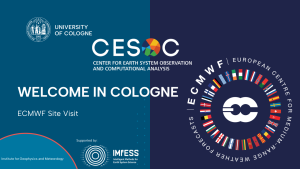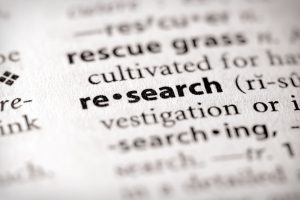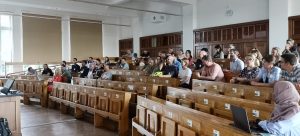PAST EVENTS
2023
Please find listed below all our events (conferences, seminars, talks etc.) that took place in 2023.
ECMWF location visit in Cologne

The Center of Earth System Observation and Computational Analysis (CESOC) hosts its third and last location visit
CESOC Seminar Series "My research" winter term 2023/24

CESOC continued the seminar series “My research” Fridays at 3:30 pm in which members of CESOC gave a talk on their research, have a look at the speakers here:
CESOC First Members’ Assembly
Call: ECMWF Code for Earth Program
Code for Earth is a key innovation action run by the European Centre for Medium-Range Weather Forecasts (ECMWF)..
CESOC Seminar Series "My research" summer term 2023

CESOC continued the seminar series “My research” Fridays at 3:30 pm in which members of CESOC gave a talk on their research, have a look at the speakers here:
2022
Please find listed below all our events (conferences, seminars, talks etc.) that took place in 2022.
NEWS: CESOC and ECMWF – Close alliance in Earth System Science
Please find the full article and photos here: https://cesoc.net/cesoc-ecmwf-alliance/
NEWS: ECMWF Fellowships in collaboration with CESOC announced
The Deutscher Wetterdienst (DWD) announced four Early Career Fellows at the ECMWF site in Bonn for a period of 2 years as of January 2023 for the STEP UP! Fellowship programme for early career scientists.
NEWS: Two new research units on artificial intelligence at University of Bonn
Contact for the media:
Prof. Dr. Petra Mutzel
Computational Analytics
Institute for Computer Science
University of Bonn
Tel. +49-228/7369917
E-mail: petra.mutzel@cs.uni-bonn.de
CESOC Seminar Series "My research" winter term 2022/23

CESOC continued the seminar series “My research” Fridays at 3pm in which members of CESOC gave a talk on their research, have a look at the speakers here:
https://cesoc.net/cesoc-seminar-series-my-research-winter-term-2022-23/
CALL: Virtual NASA JPL Center for Climate Sciences Summer School 2022
— Application period closed —
Each year, the Jet Propulsion Laboratory (JPL) Center for Climate Sciences (CCS), along with co-sponsors, the Keck Institute for Space Studies (KISS) at the California Institute of Technology (Caltech), and NASA’s Earth Science Division, assemble a new generation of climate scientists to engage with and learn from leading climate scientists from NASA, Caltech, and other universities and institutions. Applications are now being accepted through 30 April 2021 from science and engineering graduate students and postdocs to fill approximately 25 slots. The 2021 Summer School is currently planned as a virtual event from 9-13 August 2021, with the possibility of extending activities two days into the week prior or post.
Information about the school, as well as a link to apply can be found at the Summer School page. Students will participate in school activities via Webex for two days in the first week and in-person for 5 days at The Keck Institute for Space Studies (KISS) at Caltech in Pasadena, California during the second week. This annual event focuses on “Using Satellite Observations to Advance Climate Prediction”. Students will explore how satellite observations can be used to understand the climate system and improve climate models.
CALL: ECMWF Summer of Weather Code (ESOWC)
CESOC Seminar Series "My research" summer term 2022

CESOC continued the seminar series “My research” Fridays at 3pm in which members of CESOC gave a talk on their research, have a look at the speakers here:
https://cesoc.net/my-research-summer-term-2022/
2021
Please find listed below all our events (conferences, seminars, talks etc.) that took place in 2021.
NEWS: New Collaborative Research Center (CRC) at University of Bonn
A new Collaborative Research Centre (CRC) at the University of Bonn with strong connection to CESOC (the speaker is one of the founding directors of CESOC: Prof. Jürgen Kusche) will be established for 4 years from 1 January 2022 onwards, funded with almost 10 million euros by the German Research Foundation (DFG):
The CRC1502 “Regional Climate Change: The Role of Land Use and Water Management”.
Man-made climate change has already increased the frequency of extreme events such as heat waves, droughts and heavy precipitation – experts predict a continuation of this trend for the rest of the 21st century. “The consequences of this, for example drying out soils in some regions and increasing flooding in others, threaten the coexistence and existence of future generations,” says Prof. Dr. Jürgen Kusche from the Institute of Geodesy and Geoinformation at the University of Bonn, speaker of the new Collaborative Research Center. “They pose significant risks, including to sustainable agricultural production and thus to food supplies.”
The far-reaching influence of climate gases, especially CO2 and methane, on the global climate is undisputed. In the Collaborative Research Center 1502 “Regional Climate Change: The Role of Land Use and Water Management,” the researchers investigate the hypothesis that human-induced land use change and intensified water management also influence regional climate – leading to unintended changes in the natural regional water and energy cycle. The hypothesis to be investigated in the CRC even goes so far as to suggest that such changes have already contributed significantly to the observed trends in the regional water cycle.
To investigate this hypothesis further, researchers from a wide range of disciplines come together – including hydrology, meteorology, geodesy, earth system modeling, remote sensing, agricultural economics and social sciences. Together, they aim to develop a model system that will be able to map, in particular, those human-climate interactions associated with changes in the continental hydrological cycle. The project groups of the CRC will initially focus on Europe in the first, four-year funding phase. The goal is to develop a coupled model system that will map not only the dynamics of the individual components of the Earth system, but also their interactions with each other, and will serve in particular to quantify human-induced influences on the natural regional water cycle. “Our research results achieved in the CRC will serve as a basis for the development of criteria for sustainable land and water use, in terms of the regional climate,” Jürgen Kusche emphasizes.
Other partners include Forschungszentrum Jülich, Deutscher Wetterdienst (DWD) and the Universities of Cologne and Göttingen.
The Collaborative Research Center is thematically embedded in the Transdisciplinary Research Areas “Modeling” and “Sustainable Futures” of the University of Bonn.
Funding amount:
almost 10 million euros
Speaker:
Prof. Dr. Jürgen Kusche, Chair of Astronomical, Physical and Mathematical Geodesy; Institute for Geodesy and Geoinformation (IGG), University of Bonn
Co-speaker:
– Prof. Dr. Silke Hüttel, Chair of Production Economics, Institute of Food and Resource Economics (ILR), University of Bonn
– Prof. Dr. Harry Vereecken, Institute for Bio- and Geosciences, Forschungszentrum Jülich
CESOC Seminar Series "My research" winter term 2021/22

CESOC continues the seminar series “My research” Fridays at 3pm in which members of CESOC will give a talk on their research and are happy to answer questions afterwards in a short discussion.
We are happy to welcome you, starting on Friday, October 15, 2021. You find further information in the table below.
| Date | Speaker | Title | Affiliation |
| 15.10.2021 | Prof. Ulrich Löhnert | Exploiting new observations for meteorological applications |
Institute of Geophysics and Meteorology, University of Cologne |
| 22.10. | Prof.’in Ribana Roscher | Benefits and opportunities of explainable machine learning in the environmental sciences |
Institute for Geodesy and Geoinformation, University of Bonn |
| 29.10. | Prof. Michael Schindelegger | Intertwined tales of Earth rotation and ocean models |
Institute for Geodesy and Geoinformation, University of Bonn |
| 5.11. | Prof.’in Stephanie Fiedler | Fundamental meteorological research for renewable power | Institute of Geophysics and Meteorology, University of Cologne |
| 12.11. | Prof. Martin Riese | Impact of the Asian monsoon on upper troposphere / lower stratosphere (UTLS) composition | Institute for Energy and Climate Research – Stratosphere (IEK-7), Forschungszentrum Jülich |
| 19.11. | Prof. Roel Neggers |
Hemispheric evaluation of clouds in large-eddy simulations based on ray tracing – postponed to next semester No Talk due to Geoverbund Members’ assembly |
Institute of Geophysics and Meteorology, University of Cologne |
| 26.11. | Prof. Stefan Kollet | Modeling of Terrestrial Systems: Science and Technology | Institute for Bio- and Geosciences – Agrosphere (IBG-3), Forschungszentrum Jülich |
|
3.12. ! 12pm |
Prof.’in Tatiana Landesberger von Antburg | Visual Journey to Insights | Institute for Computer Science, University of Cologne |
| 10.12. | Prof.’in Petra Mutzel | Computational Analytics | Computational Analytics, University of Bonn |
| 17.12. | Prof. Axel Klawonn | no seminar – postponed to next semester |
Computational Mathematics and Scientific Computing, University of Cologne |
| 14.01.2022 | PD Dr. Martin Schultz | The Pilot Lab Exascale Earth System Modelling | JSC, Forschungszentrum Jülich |
| 21.01. | Prof. Joachim Saur | Diagnosing plasmas: The search for subsurface oceans and the analysis of turbulent flows |
Institute of Geophysics and Meteorology, University of Cologne |
| 28.01. | PD Dr.’in Silke Trömel | Radar polarimetry and its applications | Institute for Geosciences, Department of Meteorology University of Bonn |
| 04.02. | Prof. Gregor Gassner | Accuracy of High-Order Schemes for Underresolved Turbulence | Numerical Simulation, University of Cologne |
NEWS: New ECMWF site officially opened in Bonn
ECMWF becomes a multi-site organisation
13 September 2021 was the official opening ceremony of ECMWF’s new interim offices in Bonn. After several speeches in the building of the Ministry of Transport and Digital Infrastructure (BMVI), the ECMWF’s flag was raised today in front of the Ministry for Environment, Nature Conservation and Nuclear Safety (BMU), the new home, before it moves to a brand new building to be ready in 2026.
Some tweets:
Wir wünschen dem Europäischen Zentrum für mittelfristige #Wetter-Vorhersage @ECMWF einen guten Start in Bonn. Herzlich willkommen!?#OneECMWF
https://t.co/6jrS6O09h3
— BMVI (@BMVI) September 13, 2021
Director General @FlorenceRabier raises our flag as part of the official opening of our new site in #Bonn. This marks an exciting new phase for us as we strengthen ties with our Member States through new locations in Europe.#OneECMWF
https://t.co/rZj8XZLAwb
pic.twitter.com/CxeYzWhFkd
— ECMWF (@ECMWF) September 13, 2021
CESOC Seminar Series “My research” starts summer term 2021
CESOC starts a new seminar series Fridays at 3pm in which the members of CESOC will give a talk on their research and are happy to answer questions afterwards in a short discussion.
We are happy to welcome you, starting on Friday, June 18, 2021. You find further information in the table below.
| Date | Speaker | Title | Affiliation |
| 18.06.2021 | Prof. Jürgen Kusche | The mathematics of sea level rise (and what we observe in the real world) | Institute for Geodesy and Geoinformation, University of Bonn |
| 25.06.2021 | Prof.’in Astrid Kiendler-Scharr | Observational and modelling tools for atmospheric composition: what we have and what we need | Institute for Energy and Climate Research – Troposphere (IEK-8), Forschungszentrum Jülich |
| 02.07.2021 | Prof. Christian Sohler | Algorithms for the analysis of very large data sets | Institute for Computer Science, University of Cologne |
| 09.07.2021 | Dr. Hanno Scharr | Image Processing from Plant Roots to Remote Sensing Applications | Institute of Bio- und Geosciences – Plant Sciences (IBG-2), Forschungszentrum Jülich |
| 16.07.2021 | Prof.’in Anne Driemel | Models for Trajectory and Subtrajectory Clustering | Institute of Computer Science V, Algorithms and Complexity, University of Bonn |
| 23.07.2021 | Prof.’in Susanne Crewell | Atmospheric water cycle: how can we improve our understanding by observations and modelling | Institute of Geophysics and Meteorology, University of Cologne |
NEWS: New CESOC coordinator took office
On May 3rd 2021 the new coordinator of CESOC Sybille Yvonne Schoger started her position in Cologne. In close cooperation with the founding directors she will be responsible for advancing and neworking within and beyond CESOC, public relations including the website, support for developing the third-party funds and will handle and coordinate all new tasks that lie ahead. The founding directors welcome her and wish her a good start.
To contact Sybille Y. Schoger, please click here
CALL: Virtual NASA JPL Center for Climate Sciences Summer School 2021
— Application period closed —
Each year, the Jet Propulsion Laboratory (JPL) Center for Climate Sciences (CCS), along with co-sponsors, the Keck Institute for Space Studies (KISS) at the California Institute of Technology (Caltech), and NASA’s Earth Science Division, assemble a new generation of climate scientists to engage with and learn from leading climate scientists from NASA, Caltech, and other universities and institutions. Applications are now being accepted through 30 April 2021 from science and engineering graduate students and postdocs to fill approximately 25 slots. The 2021 Summer School is currently planned as a virtual event from 9-13 August 2021, with the possibility of extending activities two days into the week prior or post.
Information about the school, as well as a link to apply can be found at https://climatesciences.jpl.nasa.gov/events/summer-school/about/. Students will participate in school activities via Webex and other meeting web platforms.
This annual event focuses on “Using Satellite Observations to Advance Climate Prediction”. Students will explore how satellite observations can be used to understand the climate system and improve climate models.
PRESS: Article in the University of Cologne magazine (german only)
Jan Voelkel, Wissenschaftsredakteur der Universität zu Köln, hat im Universitätsmagazin in der Ausgabe März 2021 einen schönen Beitrag zum CESOC verfasst. Der Artikel als Printversion findet sich unter nachfolgendem Link:
Link zur PDF.
2020
Please find listed below all our events (conferences, seminars, talks etc.) that took place in 2020.
TALK: Satellite remote sensing for river hydrology
Dr. Elena Zakharov, Maynooth University of Ireland and Institute of Water Problem RAS Moscow Russia
11th Dec 2020, 11am.
Observations of river discharge have significantly reduced over the last 30 years. Although many national services continue observations of key rivers at key stations, the availability of these observations for the scientific community and for climate research is limited. Alternative methods of estimation and monitoring of river flow (modelling and satellite observations) have been rapidly developed to fill this gap. Hydrological modelling is a powerful tool giving insights at regional or basin scales; while satellites can provide worldwide observations. One of the widely used EO methods of discharge estimation is based on satellite altimetry. Altimetry provides reliable regular and weather-independent measurements of water height at a river cross-section. During the last two decades, several methods exploiting these measurements have been developed and tested worldwide on rivers of different size and morphology. Current presentation is dedicated to the review of the main methods and to assessment of the main factors affecting the accuracy of the EO discharge retrievals. Among the factors the satellite performance, the river scale, the character of the water regime and the channel morphology will be discussed.
TALK: How data science supports the global Tropospheric Ozone Assessment Report?
Colloquium by PD Dr. Martin G. Schultz, Jülich Supercomputing Centre, Forschungszentrum Jülich
30th Nov 2020, 5:00 pm.
The Tropospheric Ozone Assessment Report (TOAR) is an international activity involving more than 200 scientists, who summarize the state-of-research on tropospheric ozone, its global distribution and trends. Ozone is an important air pollutant with short and long-term impacts on human health, vegetation, and climate. The first phase of TOAR has recently been concluded. It produced 10 peer-reviewed articles in the open access journal Elementa – Science of the Anthropocene and one of the world’s largest collections of ground-level ozone measurements, which are freely available from the JSC web service https://join.fz-juelich.de. Over 30 independent follow-up publications have resulted from TOAR-I. Recently, TOAR began its second phase, aiming at an updated assessment in 2024. Again, this will be supported by JSC’s data infrastructure, but also through the development of new statistical methods and machine learning concepts, funded through the ERC Advanced Grant IntelliAQ. This talk will briefly summarize the main achievements of TOAR-I, introduce the enhanced TOAR data infrastructure under development at JSC and provide a glimpse into the machine learning activities of my Earth System Data Exploration group at JSC.
RINGVORLESUNG: "Die Welt im Computer" Wintersemester 2020/21
Einführung in Big Data, Machine Learning und Quantitative Modellierung
Wednesdays – Winter term 2020/21, in German
PRESS: Bonn to host new ECMWF premises
The European Centre for Medium-Range WeatherForecast (ECMWF) expands activities to Bonn, Germany. Staff will move around summer 2021.
More to read in the press release from ECMWF.
PRESS: Center for Earth System Observation and Computational Analysis: CESOC founded
On 1st October 2020 the Universities of Bonn and Cologne and the Forschungszentrum Jülich founded the Center for Earth System Observation and Computational analysis (CESOC).
Read more within the related press release published by the founding institutions:


